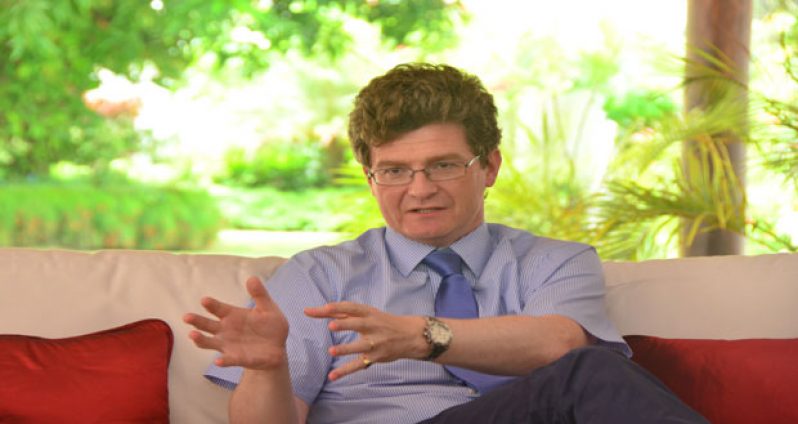GUYANA currently has on hold several million Euros’ worth in development aid from the European Union (EDF).
This financing, to be released only after General Elections, would also be coming with additional conditionalities.
The newest British High Commissioner to take up office in Guyana, His Excellency Mr Greg Quinn, made this announcement during a recent sit-down interview with members of the local media corps in his first assignment since assuming the post of British High Commissioner recently.
Mr Quinn informed that, under the previous arrangement, funds coming to Guyana under the European Development Fund (EDF) were deposited directly to the Consolidated Fund, to be used as part of the national coffers. This, Quinn said, will no longer be the case, as the money would now be project-based.
The next tranche of funding under the 11th EDF, some €34M, would be project-based, according to Quinn. This means that “it will go exactly where you want it to go…it will go to specific activities, and therefore it will be targeted at specific activities,” he explained.
Guyana began receiving funds from the EU’s EDF following a unilateral decision by the Europeans to no longer offer preferential pricing and quotas on sugar imported from these shores.
This led to Guyana’s immediate loss of revenue to the tune of millions of US dollars annually, plunging the Guyana Sugar Corporation (GuySuCo) into massive financial turbulence.
From the United Kingdom’s perspective, High Commissioner Quinn explained, the EU would like to see sugar from Guyana being sold on the world market at a profit, making it no longer necessary for the Guyana Government to have to massively subsidise the industry annually.
He told reporters, “You know, UK sugar companies like Tate & Lyle, for example, have for decades – generations — purchased a large amount of their sugar from here; and they still do.”
Quinn explained that while he personally is not wholly familiar with the details of the changes that would have come about regarding quotas and preferential pricing, “what is done is done, and what we need to do is try and find a way to move on.”
He said that one of the ways to move on “is to figure out how to make the sugar industry here as good and as efficient as it can possibly be.” This has to be done in face of the prevailing low sugar prices, “and in the light of the challenges to the sugar industry globally.”
Both the United Kingdom and the EU, Quinn said, have set themselves the task of working to ensure that Guyana’s sugar industry recovers and performs;
thereby allowing Guyana to be able to export sugar at a profit, and not having to subsidize “what is a very important industry.”
Quinn said, “There is no question about the industry continuing…Sugar is a vital industry for Guyana, the same way rice is a vital industry; the same way gold is a vital industry.”
By Gary Eleazar




.png)









